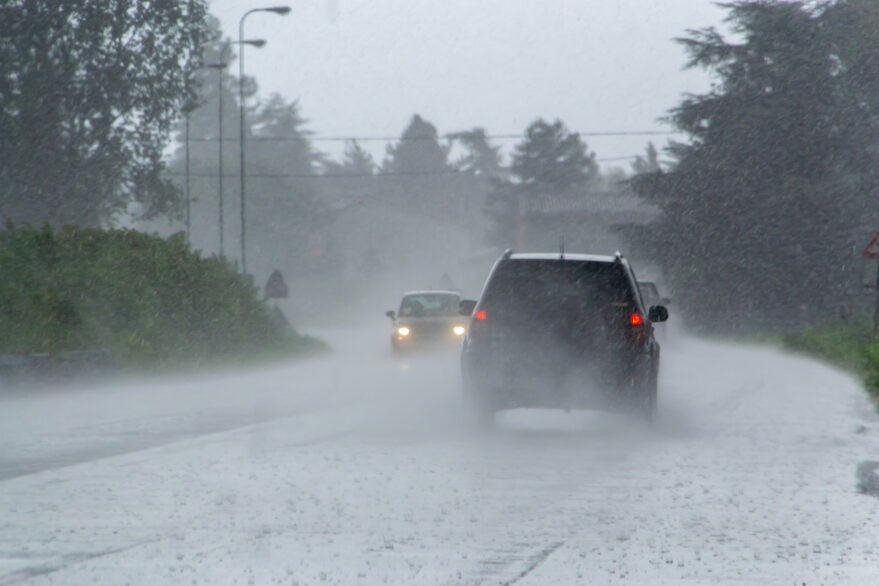What Causes Hydroplaning — And How To Avoid It

Driving in the rain can be scary, especially on Denver’s often slippery roads. One of the most dangerous risks — hydroplaning — happens when your car’s tires lose contact with the road and slide across the water instead.
How Does Hydroplaning Happen?
Hydroplaning occurs when your tires can’t push water away fast enough. When you drive on a wet road, your tires need to move water aside to touch the pavement, and if you drive too fast or have worn-out tires, this becomes hard to do.
Think of it like this — water builds up in front of your tire, and when there’s too much water, it lifts your tire off the road. Now, your tire is riding on a thin layer of water instead of the road, and that’s when you lose control.
What Causes Hydroplaning On Denver Roads?
Several things can make hydroplaning more likely in Denver:
- During summer storms, sudden downpours can quickly make roads dangerous
- Roads that don’t drain well collect water, increasing your risk
- The faster you go, the less time your tires have to push water away
- Tires with shallow treads can’t move water well, making hydroplaning more likely, even at lower speeds
- Underinflated tires don’t make good contact with the road and can’t channel water properly
Rain and wet pavement significantly increase crash risk, with 75 percent of weather-related car accidents occurring on wet pavement and 47 percent happening during rainfall.
How Do You Prevent Hydroplaning While Driving In Denver?
It’s much better to prevent hydroplaning than to deal with it once it happens.
Keep Your Tires in Good Shape
Your tires are your only contact with the road. They should be replaced when the tread depth reaches 1/16 of an inch. To check this, place a penny into your tire’s tread with Lincoln’s head pointing toward the tire. If you can see the top of Lincoln’s head, you need new tires. Additionally, check tire pressure monthly and before long trips.
Change How You Drive When It’s Raining
Simple changes to how you drive can greatly reduce hydroplaning risk. These changes include:
- Slow down when it’s raining, even if it’s just a light shower
- Avoid quick starts and stops or sharp turns
- Leave more space between you and the car ahead — at least 5-6 seconds in wet conditions
- Drive in the tracks left by other cars, where some water has already been pushed aside
- Stay away from puddles and standing water
- Turn off cruise control when roads are wet
These simple adjustments can make the difference between a safe trip and a dangerous skid during Denver’s unpredictable rain storms.
Watch Out for Risky Areas
Be extra careful in situations where water tends to collect:
- Low spots in the road
- Curves where water can pool on the inside lane
- Outside lanes where water collects from the crown of the road
- Areas with visible puddles
- The first 10-15 minutes after rain begins, when oil on the road makes it extra slippery
Being aware of these high-risk areas can help you avoid becoming a crash statistic.
What Should You Do If Your Car Is Hydroplaning?
Even if you’re careful, you might still experience hydroplaning. Here’s what to do :
- Stay calm
- Ease off the gas pedal slowly, and don’t hit the brakes hard
- Hold the steering wheel firmly, but don’t make sudden turns
- Keep the wheels pointed straight ahead or make only very gentle steering corrections in the direction you want to go
- Wait for the tires to grip the road again as you slow down
If you’ve been in a car accident in Denver because of hydroplaning, consider talking to a lawyer.
Staying Safe On Wet Roads
It’s safer to stay off the roads in dangerous conditions. However, it’s not entirely practical. To ensure hydroplaning doesn’t cause you to crash into other cars, pedestrians, or motorcycles, stay vigilant, adjust your driving accordingly, and always keep your tires in good condition.
Contact our Denver Car Accident Attorneys at Zaner Law Personal Injury Lawyers at (720) 613 9706
For more information, please contact the Denver car accident lawyers at Zaner Law Personal Injury Lawyers to schedule a free initial consultation with a personal injury lawyer.
We are located in Denver, CO, and proudly serve all of Denver County.
Zaner Law Personal Injury Lawyers
1610 Wynkoop Street, Suite 120.
Denver, CO 80202
(720) 613 9706
Find us with our Geocoordinates: 39.75208145814397, -105.00017355026108
About The Author

Kurt Zaner has earned national recognition for his innovative legal strategies, securing some of the largest verdicts in Colorado. He assists injured clients in Denver with personal injury cases, including car accidents, truck accidents, wrongful death, motorcycle accidents, and more. Click here to view some of the fantastic case results that Zaner Law has successfully handled.
Location: Denver, CO


